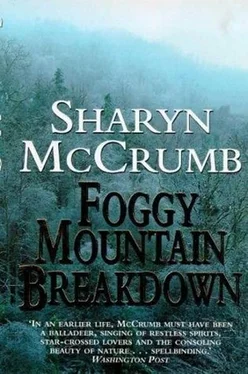Sharyn McCrumb - Foggy Mountain Breakdown and Other Stories
Здесь есть возможность читать онлайн «Sharyn McCrumb - Foggy Mountain Breakdown and Other Stories» весь текст электронной книги совершенно бесплатно (целиком полную версию без сокращений). В некоторых случаях можно слушать аудио, скачать через торрент в формате fb2 и присутствует краткое содержание. Жанр: Детектив, на английском языке. Описание произведения, (предисловие) а так же отзывы посетителей доступны на портале библиотеки ЛибКат.
- Название:Foggy Mountain Breakdown and Other Stories
- Автор:
- Жанр:
- Год:неизвестен
- ISBN:нет данных
- Рейтинг книги:3 / 5. Голосов: 1
-
Избранное:Добавить в избранное
- Отзывы:
-
Ваша оценка:
- 60
- 1
- 2
- 3
- 4
- 5
Foggy Mountain Breakdown and Other Stories: краткое содержание, описание и аннотация
Предлагаем к чтению аннотацию, описание, краткое содержание или предисловие (зависит от того, что написал сам автор книги «Foggy Mountain Breakdown and Other Stories»). Если вы не нашли необходимую информацию о книге — напишите в комментариях, мы постараемся отыскать её.
Foggy Mountain Breakdown and Other Stories — читать онлайн бесплатно полную книгу (весь текст) целиком
Ниже представлен текст книги, разбитый по страницам. Система сохранения места последней прочитанной страницы, позволяет с удобством читать онлайн бесплатно книгу «Foggy Mountain Breakdown and Other Stories», без необходимости каждый раз заново искать на чём Вы остановились. Поставьте закладку, и сможете в любой момент перейти на страницу, на которой закончили чтение.
Интервал:
Закладка:

Sharyn McCrumb
Foggy Mountain Breakdown and Other Stories
© 1997
To Mary Frances Amick Hinte,
wherever she is
INTRODUCTION

I COME FROM a race of storytellers.
My father’s family-the Arrowoods and the McCourys-settled in the Smoky Mountains of western North Carolina in 1790, when the wilderness was still Indian country. They came from the north of England and from Scotland, and they seemed to want mountains, land, and as few neighbors as possible.
The first of the McCourys to settle in America was my great-great-great-grandfather Malcolm McCoury, a Scot who was kidnapped as a child from the island of Islay in the Hebrides in 1750, and made to serve as a cabin boy on a sailing ship. He later became an attorney in Morristown, New Jersey; fought with the Morris Militia in the American Revolution; and finally settled in what is now Mitchell County, western North Carolina, in 1794. Yet another “connection” (a distant cousin) is the convicted murderess Frankie Silver (1813-1833), who was the first woman hanged for murder in the state of North Carolina.
I grew up listening to my father’s tales of World War II in the Pacific, and to older family stories of duels and of escapades in Model T Fords. With such adventurers in my background, I grew up seeing the world as a wild and exciting place; the quiet tales of suburban angst so popular in modern fiction are Martian to me.
Storytelling is an art form that I learned early on. When I was a little girl, my father would come in to tell me a bedtime story, which usually began with a phrase like “Once there was a prince named Paris, whose father was Priam, the king of Troy…” Thus I got The Iliad in nightly installments, geared to the level of a four-year-old’s understanding. I grew up in a swirl of tales: the classics retold; ballads or country songs, each having a melody, but above all a plot; and family stories about Civil War soldiers, train wrecks, and lost silver mines.
My mother contributed stories of her grandfather, John Burdette Taylor, who had been a sixteen-year-old private in the 68th North Carolina Rangers (CSA). His regiment had walked in ragbound boots, following the railroad tracks, from Virginia to Fort Fisher, site of a decisive North Carolina battle. All his life he would remember leaving footprints of blood in the snow as he marched. When John Taylor returned home to Carteret County, southeastern North Carolina, at the end of the war, his mother, who was recovering from typhoid, got up out of her sickbed to attend the welcome home party for her son. She died that night.
My father’s family fund of Civil War stories involved great-great-uncles in western North Carolina who had discovered a silver mine or a valley of ginseng while roaming the hills, trying to escape conscription into one marauding army or the other. There were the two sides of the South embodied in my parents’ oral histories: Mother’s family represented the flatland South, steeped in its magnolia myths, replete with Gorham sterling silver and Wedgwood china. My father’s kinfolks spoke for the Appalachian South, where the pioneer spirit took root. In their War between the States, the Cause was somebody else’s business, and the war was a deadly struggle between neighbors. I could not belong completely to either of these Souths because I am inextricably a part of both.
This duality of my childhood, a sense of having a foot in two cultures, gave me that sense of otherness that one often finds in writers: the feeling of being an outsider, observing one’s surroundings, and looking even at personal events at one remove.
So much conflict; so much drama; and two sides to everything. Stories, I learned, involved character, and drama, and they always centered around irrevocable events that mattered.
This book is a collection of almost all the short stories I have ever written. Some of them are serious character studies (“A Predatory Woman,” “Among My Souvenirs,” “The Matchmaker”); some are sad stories set in the Southern mountains (“Precious Jewel,” “Telling the Bees,” “Old Rattler”); and some are whimsical tales of fantasy and humor (“An Autumn Migration,” “Remains to Be Seen,” “Nine Lives to Live”). The difference in styles reflects the duality in my nature: Mountain versus Southern, Daddy’s side versus Mother’s side. I like to think that both of them win.
The earliest story in the collection, “Love on First Bounce,” is a semidocumentary of my adolescence in a small Southern town, and the first draft was written when I was in high school. It marks the first appearance of Elizabeth MacPherson, the heroine of many of my novels. I hear her voice, too, in the narrator of “Southern Comfort.” Compare the sunny life of that suburban child to the dark, spartan boyhood described in “Foggy Mountain Breakdown,” which is a portrait of my father’s youth in the Tennessee mountains.
Sometimes when I write short stories I set myself a task. “Precious Jewel,” based on my father’s family, was an attempt to see if I could write a short story in which the most vivid character does not appear: Addie McCrory is dead when the narrative begins. “John Knox in Paradise” is the old Scots Border tale of Thomas the Rhymer, retold in modern terms, with True Thomas and his captor the Queen of Elfland recast as a modern Scot and a young American woman.
The ideas came from many different places: from correspondence with a reader I’ve never met (“Gentle Reader”); from something I saw that triggered an idea (“Remains to Be Seen”-the mummy described in the story really was on display in an army surplus store in North Carolina years ago); from a newspaper article (“Not All Brides Are Beautiful,” my cynical reaction to the wedding of an inmate on Virginia’s death row).
No matter where the ideas originate, though, they are all filtered through my own split perception, to be sorted into “Southern” or “Mountain.” If I had to pick out one common thread present in each of these vastly different stories, I would say that it is this: in every single story, there is someone who feels like a stranger.
PRECIOUS JEWEL

DYING COST NOTHING and could be done alone-otherwise, Addie Hemrick might have lived forever. As it was, she grudgingly loosed her spirit from its wizened body, saying no good-byes to the kinfolk duty-bound to her bedside, and leaving nothing to anyone except the obligation to bury her in sufficient style to satisfy the neighbors that the family had “done right by her.” Gone, but not forgotten. Legends of her temper and anti-sociability might outlast the marble slabs in the little mountain graveyard.
She was a McCrory from up around Cade’s Cove; one of the Solitary McCrorys, as opposed to the Tinker McCrorys or the Preaching McCrorys. Her clan was known for living in little cabins as far up the mountain as they could get and staying put. They didn’t hold with church-going, and folks in the cove said that if a bee-tracker or a drummer headed for their cabin, they hid in the woods until he went away again. Not scared, the McCrorys weren’t. It was just in their blood to keep to themselves. A Solitary McCrory could no more make small talk than he could lay an egg.
So it was one notch short of a miracle when Wesley Hemrick, the circuit preacher’s sixth boy, let it be known that he was marrying Miss Addie McCrory, of the Solitary McCrorys.
Читать дальшеИнтервал:
Закладка:
Похожие книги на «Foggy Mountain Breakdown and Other Stories»
Представляем Вашему вниманию похожие книги на «Foggy Mountain Breakdown and Other Stories» списком для выбора. Мы отобрали схожую по названию и смыслу литературу в надежде предоставить читателям больше вариантов отыскать новые, интересные, ещё непрочитанные произведения.
Обсуждение, отзывы о книге «Foggy Mountain Breakdown and Other Stories» и просто собственные мнения читателей. Оставьте ваши комментарии, напишите, что Вы думаете о произведении, его смысле или главных героях. Укажите что конкретно понравилось, а что нет, и почему Вы так считаете.












